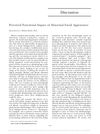Search
for
Sort by
Research
660-690 / 1000+ resultsresearch Hair Growth Control: Long-Term Results

research Role of Vitamin D in Skin and Hair Biology
Vitamin D is important for healthy skin and hair.
research The Skin
research Biological Actions of Oligomeric Procyanidins: Proliferation of Epithelial Cells and Hair Follicle Growth
Oligomeric procyanidins may help hair grow by affecting cell growth and the hair growth cycle.

research Androgenetic Alopecia
Androgenetic alopecia is a common form of hair loss in both men and women.

research Minireview: Vitamin D Receptor: New Assignments for an Already Busy Receptor
The vitamin D receptor has many roles in the body beyond managing calcium, affecting the immune system, hair growth, muscles, fat, bone marrow, and cancer cells.

research Minoxidil, Finasteride, And Dutasteride
Minoxidil, finasteride, and dutasteride are treatments for hair loss.

research Use of the TrichoScan to Assess Female Pattern Hair Loss
TrichoScan helps identify subtle hair thinning in women with androgenetic alopecia.

research Developing Optical Biometrics Using Optical Coherence Tomography for Medical Screening and Diagnosis
OCT can effectively screen and diagnose various medical conditions non-invasively.
research Allergies and Hair Dyes

research Wigs And Hair Prosthetics
Wigs and hair prosthetics boost confidence and quality of life for people with hair loss.
research Male Accessory Sex Glands
Male accessory sex glands in rats rarely develop tumors and respond to hormones.

research Elevation of Circulating DNAs of Disease-Associated Cytokines in Serum Cell-Free DNA from Patients with Alopecia Areata
Higher levels of certain DNAs in blood may indicate hair follicle damage in alopecia areata patients.
research An Observational Study to Standardize the Dermoscopic Findings of Normal Scalp and Hair in Males
Standardized data is essential for diagnosing scalp and hair conditions in males.
research Clinical Quiz No. 2: Dermatophycosis in Animals
Dermatophycosis is a treatable fungal skin infection spread by contact with infected animals.
research Immunostimulation Increases Hair Growth in Patients with Alopecia
research Animal Models for Wound Healing
Animal experiments help understand and test treatments for healing wounds and reducing scars.
research Progressive Effects of an Anti-Androgen on Sebaceous Secretion and Body Hair Growth in Hirsute Women
research Plasma Testosterone and Dihydrotestosterone in Cryptorchid Boys Treated with HCG

research Optical Coherence Tomography as an Advanced Tool in Different Applications
Optical Coherence Tomography has potential in diagnosing hair loss and monitoring blood clotting, and could be improved for deeper tissue observation and better hair loss understanding.
research Metabolism of Androgens by Isolated Human Beard Hair Follicles
Human beard hair follicles change testosterone into other related hormones, but don't much change androstenedione into testosterone.
research Epilepsy Drug May Also Treat Baldness
research Nutritional Factors Influencing Hair and Wool Growth
research Hair Color Measurement
Hair color is important in many fields and is measured for various purposes.
research Exosomes/EVs: Advanced Cell-Based Therapies for Hair Loss: A Comprehensive Systematic Review
research Prenatal Diagnosis of a Fetus with Partial Monosomy 4p and Partial Trisomy 13q
Topical corticosteroids are the best initial treatment for children with Alopecia Areata.

research Perceived Functional Impact of Abnormal Facial Appearance
People with facial disfigurements are judged more negatively, highlighting the social benefits of corrective surgery.

research Complementary and Alternative Medicine for Hair Loss
Alternative medicine might help with hair loss.
research S124 Variants of Myxoid Cysts: Diagnosis and Treatment
Common hair loss can be diagnosed with a physical exam and sometimes a hair test or skin biopsy, and treated with medication or surgery, with ongoing treatment needed to keep results.